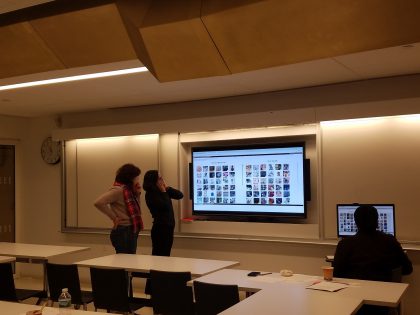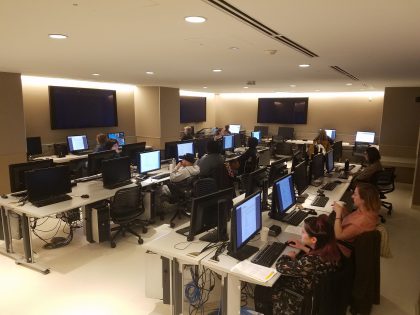
February is a busy time of year for the national office of the Alliance for Young Artists & Writers. This is when we gather dozens of leaders in the fields of art and literature to judge all of the works that received a Gold Key, our highest regional honor, in the Scholastic Art & Writing Awards. All Gold Key works are forwarded by our local Affiliate Partners to New York City for national judging, where they will be reviewed by creative professionals such as painters, poets, video game designers, book editors, museum directors, and authors. Jurors read thousands of works and review thousands of images in order to select the works that receive National Medals.
Before judging begins, we explain to our jurors the principles of judging. Tenets of the Awards and steeped in tradition, these principles have been in use since the founding of the Awards in 1923:
- Freedom of Expression
- Blind Judging
- Three Criteria: Originality, Technical Skill, and Emergence of a Personal Vision or Voice
Freedom of Expression
Jurors must keep in mind that our young artists and writers are free to explore any and all topics in their creative works. There are no pre-defined prompts and no work is ever disqualified from the Awards because of the nature of its content. If jurors ever feel like they cannot judge a work fairly because of personal biases, we ask jurors to recuse themselves from judging that work. Recused works are then sent to new judges to be reviewed fairly.
Blind Judging
The Awards are adjudicated without knowledge of the artists’ or writers’ identity. This means that jurors do not know the creator’s name, gender, home town, age, grade, or any other identifying information when reviewing a work. Awards are determined on a merit basis with only the art or writing under review.

Three Criteria
When reviewing submissions, we ask that our jurors take into consideration the Awards’ three criteria: Originality, Technical Skill, and Emergence of a Personal Vision or Voice.
What is Originality?
Many of the works submitted to the Awards began as classroom assignments. A functional definition of originality is work that goes beyond the classroom assignment and demands its own reason to exist in the world. Works of high originality challenge conventions, blur the boundaries between genres, and shift jurors’ notions of how a particular concept or emotion can be expressed. We encourage our jurors to look for works that surprise them.
What is Technical Skill?
Technical skill is judged on how the student uses art and writing techniques to advance an original perspective or a personal vision or voice. Rather than being evaluated for specific skill proficiencies, students will be evaluated on how they used their skills to create something unique, powerful, and innovative.
What is Personal Vision or Voice?
We all know what the personal visions and voices of Awards alumni Andy Warhol, Truman Capote, Richard Avedon, and Sylvia Plath looked and sounded like when they became professional artists and writers. But what did their works look and sound like when they were teenagers? This is precisely the question we ask our jurors to consider during the judging process. It’s no coincidence that the Awards have identified some of the most important creative minds of the past nine decades. We are in the business of identifying the self-possessed, unique visions and voices of teenage artists and writers.
Want to dive deeper into the judging experience? Find out what it was like being a juror for the 2017 Scholastic Awards, or feel like you’re sitting in on a panel in this New Yorker article about judging works in the Photography category.
Judging all of the works is an integral part of the Awards, and one in which we take immense pride. Through our jurors, we’ve helped thousands of teens receive the recognition and honors they deserve for their creative efforts. It takes a lot of hours and people to judge all of the works we receive—nearly 340,000 in 2019!—but we believe it’s totally worth it!
The results of regional judging have been announced—visit our website to view a list of all Gold Key recipients. Then, come back on March 13, 2019 when we announce all of the National Medalists!
